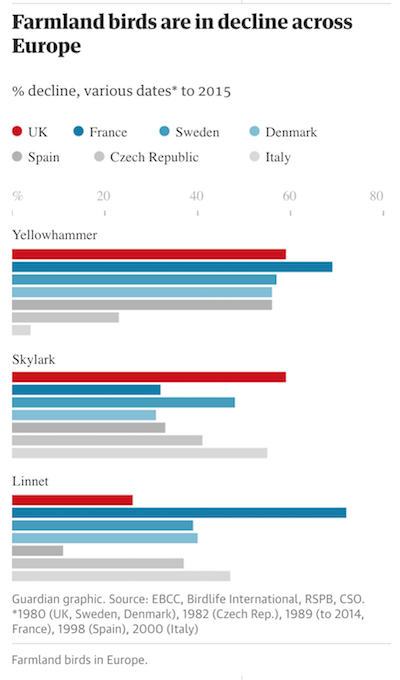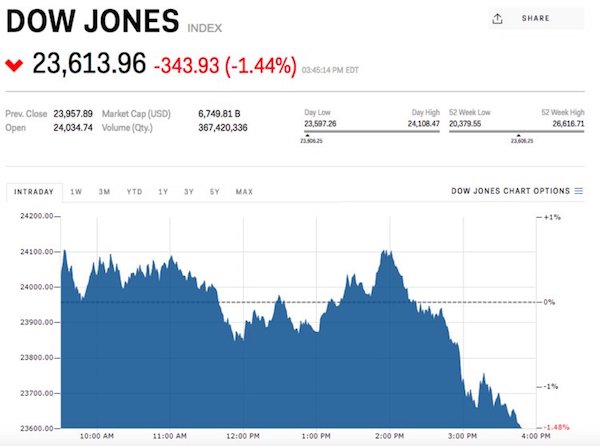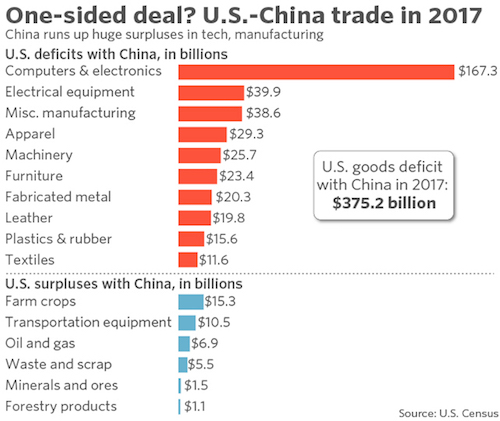
Pablo Picasso Don Quixote 1955

Denial my ass. What’s happening is the EU spends billions in taxpayers money to subsidize the complete demise of their ecosystems as well as their food supplies. The taxpayers may be in denial, but Brussels is not. The Bayer/Monsanto decision is not some stand-alone story.
• EU In ‘State Of Denial’ Over Destructive Impact Of Farming On Wildlife (G.)
Europe’s crisis of collapsing bird and insect numbers will worsen further over the next decade because the EU is in a “state of denial” over destructive farming practices, environmental groups are warning. European agriculture ministers are pushing for a new common agriculture policy (CAP) from 2021 to 2028 which maintains generous subsidies for big farmers and ineffectual or even “fake” environmental or “greening” measures, they say. In a week when two new studies revealed drastic declines in French farmland birds – a pattern repeated across Europe – the EU presidency claimed that the CAP continued to provide safe food while defending farmers and “protecting the environment”.
“The whole system is in a state of denial,” said Ariel Brunner, head of policy at Birdlife Europe. “Most agriculture ministers across Europe are just pushing for business as usual. The message is, keep the subsidies flowing.” Farm subsidies devour 38% of the EU budget and 80% of the subsidies go to just 20% of farmers, via “basic payments” which hand European landowners £39bn each year. Because these payments are simply related to land area, big farmers receive more, can invest in more efficient food production – removing hedgerows to enlarge fields for instance – and put smaller, less intensive farmers out of business. France lost a quarter of its farm labourers in the first decade of the 21st century, while its average farm size continues to rise.
A smaller portion – £14.22bn annually – of EU farm subsidies support “greening” measures but basic payment rules work against wildlife-friendly farming: in Britain, farmers can’t receive basic payments for land featuring ponds, wide hedges, salt marsh or regenerating woodland. Signals from within the EU suggest that the next decade’s CAP – which will be decided alongside the EU budget by 2019 – will continue to pay farmers a no-strings subsidy, while cash for “greening”, or wildlife-friendly farming, may even be cut. Birdlife Europe said the “greening” was mostly “fake environmental spending” and wildlife-friendly measures had been “shredded” by “loophole upon loophole” introduced by member states.
[..] This week studies revealed that the abundance of farmland birds in France had fallen by a third in 15 years – with population falls intensifying in the last two years. It’s a pattern repeated across Europe: farmland bird abundance in 28 European countries has fallen by 55% over three decades, according to the European Bird Census Council. Conservationists say it’s indicative of a wider crisis – particularly the decimation of insect life linked to neonicotinoid pesticides.


Not a general opinion.
• End the Fed. Are You Nuts? (Claire Connelly)
We often see comments on this website from people who want to ‘end the Fed’ because they think it would address the rampant corruption and collusion of governments, central banks and the private sector. In reality, ending the Fed – or any one of the central banks outside of the European Union – would simply give more power to the banks and wealthy elites whose relationships with governments and central banks are already inappropriate. Abolishing central banks would simply formalise this arrangement, undermining democracy and removing the ability of governments to respond to changes in the domestic and global economy.
The claim that banks are privately owned is factually incorrect. With the exception of the EU which began life as an industrial cartel, created and controlled by Europe’s major heavy industries (coal, steel, car manufacturers and farmers), central banks are created by and belong to federal governments. Even the ECB is owned by the central banks of EU member countries, which in turn are owned by their governments, even if most do not have the right to issue their own currencies. The US Federal Reserve was created by Congress, and its chairman is appointed by the President; the Treasury receives nearly all its profits. The same applies to the Bank of England, the Reserve Bank of Australia, Bank of Canada etc which were created by their respective Parliaments.
What do advocates of ‘ending the Fed’ think will happen if the US got rid of central banking altogether? What currency would it use exactly? The only possibility would be to replace the Fed with another, private ‘Fed’ in which case central banks would go from being co-opted by the private sector, to being formally controlled by it. Ending the Fed would make central banks the property of the private sector, which, ironically, some people believe is already the case. So it’s a little bizarre that they think demolishing central banks would somehow address corruption and malfeasance. One need only look at what happened to Greece to understand what happens when a government gives up its central bank, and the right to issue its own currency. Ending central banking is the nail in the coffin of democracy. It is giving capitalism exactly what it wants: the complete takeover of the state by the market.

What happens inside bubbles.
• Stocks Suffer Biggest Weekly Drop In More Than 2 Years (BI)
US stocks sank in trading on Friday afternoon, pushing the S&P 500 to its biggest weekly decline in two years amid concerns about US trade policy and retaliation from China. The Dow Jones industrial average fell 360 points, or 1.5%, to its lowest level since November 22. The S&P 500 fell 56 points, or 2.13%, while the Nasdaq fell 148 points, or 2.23%. On Thursday, China announced planned to impose reciprocal tariffs on 128 US products that had an import value of about $3 billion last year. US President Donald Trump had earlier announced new tariffs on $50 billion worth of Chinese goods, with the aim of reducing the $375 billion trade deficit the US has with China.

The financials sector was the biggest loser among the 11 on the S&P 500. On the Dow, Boeing and Nike were the only stocks in positive territory. The drop on Friday pushed the S&P 500 9% below its peak in late January, just short of the 10% threshold at which the index enters a correction. Meanwhile, Dropbox soared during its trading debut. Shares of the cloud-computing company gained by as much as 44% in trading amid the broader market’s weakness. Treasurys rose slightly, with the 10-year yield up by less than 1 basis point, at 2.823%.

The US will want to halt the selling off of technology.
• The Stuff The US Imports From China That Causes A Huge Trade Deficit (MW)
President Donald Trump intends to apply tariffs on Chinese goods worth up to $60 billion in an effort to slash the huge U.S. trade deficit with China and protect sensitive technologies. It won’t be easy. It might even be impossible. The U.S. has run large deficits with China for years and in some cases no longer produces certain goods such as consumer electronics that are popular with Americans. In 2017, the U.S. posted a $375.2 billion deficit in goods with China. Most glaring is the huge deficit in computers and electronics, but the U.S. is a net importer from China in most market segments except for agriculture. China has been a big buyer of American-grown soybeans and other crops. Planes made by BA also are a product in demand in China.


Little by little, the pieces fall together.
With spring, things come unstuck; an unspooling has begun. The turnaround at the FBI and Department of Justice has been so swift that even The New York Times has shut up about collusion with Russia — at the same time omitting to report what appears to have been a wholly politicized FBI upper echelon intruding on the 2016 election campaign, and then laboring stealthily to un-do the election result.
The ominous silence enveloping the DOJ the week after Andrew McCabe’s firing — and before the release of the FBI Inspector General’s report — suggests to me that a grand jury is about to convene and indictments are in process, not necessarily from Special Prosecutor Robert Mueller’s office. The evidence already publicly-aired about FBI machinations and interventions on behalf of Hillary Clinton and against Donald Trump looks bad from any angle, and the wonder was that it took so long for anyone at the agency to answer for it.
McCabe is gone from office and, apparently hung out to dry on the recommendation of his own colleagues. Do not think for a moment that he will just ride off into the sunset. Meanwhile, Peter Strzok, Lisa Page, Bruce Ohr, have been sent to the FBI study hall pending some other shoes dropping in a grand jury room. James Comey is out hustling a book he slapped together to manage the optics of his own legal predicament (evidently, lying to a congressional committee). And way out in orbit beyond the gravitation of the FBI, lurk those two other scoundrels, John Brennan, former head of the CIA (now a CNN blabbermouth), and James Clapper, former Director of National Intelligence, a new and redundant post in the Deep State’s intel matrix (and ditto a CNN blabbermouth). Brennan especially has been provoked to issue blunt Twitter threats against Mr. Trump, suggesting he might be entering a legal squeeze himself.
None of these public servants have cut a plea bargain yet, as far as is publicly known, but they are all, for sure, in a lot of trouble. Culpability may not stop with them. Tendrils of evidence point to a coordinated campaign that included the Obama White House and the Democratic National Committee starring Hillary Clinton. Robert Mueller even comes into the picture both at the Uranium One end of the story and the other end concerning the activities of his old friend, Mr. Comey. Most tellingly of all, Attorney General Jeff Sessions was not shoved out of office but remains shrouded in silence and mystery as this melodrama plays out, tick, tick, tick.

The old Washington insider doesn’t mince words.
• The Rise of the Trembling Hands (David Stockman)
We call it State-Wreck and its been heading this way for a long-time. But the Donald is the coup d’ grace in flesh and blood. He will soon have the Imperial City tied in knots, and that’s even if he doesn’t fire Robert Mueller, which most surely he should and might. Either way, there is a massive partisan blood-letting coming and the ordinarily trans-partisan Deep State will be right in the middle of the brawl. That’s because partisan Democratic hacks – led by the detestable former CIA director John Brennan – got way beyond their skis, and baldly high-jacked the tools of the Deep State in a desperate effort to prevent the election and inauguration of Donald Trump. But the unveiling of what lies in its vasty deep is now beyond recall.
The very real attempt by the Obama/Clinton leadership of the CIA/FBI/NSC/NSA/DNI/State/Homeland Security complex to meddle in the 2016 election against the Donald will all come out – even as the Dems and their legal trolls on Mueller’s witch-hunting squad become ever more shrill in their McCarthyite hysteria about the Russians. Moreover, the coming quasi-civil war will potentially bring both indictments of Obama’s election meddlers and a counter-reaction from a Mueller based campaign to oust the Donald. Indeed, what portends in the months ahead is more incendiary than anything to rock the Imperial City during the last century, at least. But here’s the thing. This is not happening in a splendid vacuum with no import for the other end of the Acela Corridor.
In fact, the entire state-driven economic and financial fantasy that has been building for more than 30 years is now squarely in harm’s way. The former always depended upon Washington based stimulus, subventions, bailouts and booty. But now having attained an asymptotic high, the Great Bubble is stranded with no Washington fixers to keep it going; instead, it is fixing to slide into a long night of deflation, disorder and decay. That is to say, we printed 2870 on the S&P 500, $19.7 trillion of GDP and $97 trillion of household net worth, but those stats weren’t the embodiment of sustainable capitalist prosperity; they were the fruit of a $68 trillion national LBO, a central bank-driven financial asset bubble that has no historical antecedent and the rise of an Imperial Deep State in Washington that is a mortal threat to both democracy and national solvency.

“..an effort to try to respond to the needs of the community in a proactive manner.”
• 2.8 Million Hongkongers To Get Cash Handout Of Up To HK$4,000 Each (SCMP)
Over one-third of Hongkongers, or 2.8 million people who did not benefit from the budget announced last month, will get a cash handout of up to HK$4,000 (US$510) each from the government, Financial Secretary Paul Chan Mo-po said on Friday. Chan’s announcement confirmed reports – including one by the Post – that the government would share the city’s HK$138 billion surplus more broadly. While it faced intense political and public pressure to do more for the needy, the government’s decision to fork out an extra HK$11 billion in handouts was not a U-turn, Chief Executive Carrie Lam Cheng Yuet-ngor insisted.
“First of all, I wouldn’t say that we are bowing to pressure, and secondly, we have not said we would not do something which we describe as a ‘share and care’ programme,” she said. Chan said he had heard the community “loud and clear”. “I think as government officials we need to have the capacity to step back and reflect the various views expressed and see how we may be able to better serve our people,” he explained. “So this scheme … is an effort to try to respond to the needs of the community in a proactive manner.” The money will be given to Hong Kong residents aged 18 years or above (as of December 31 this year) who do not own property, do not receive any government allowances, and will not pay income tax for the financial year ending next week.

The Guardian is gradually shifting its story away from Cambridge Analytica. A bit late?
• Seven Days That Shattered Facebook’s Facade (G.)
There are thousands of other developers, including the makers of dating app Tinder, games such as FarmVille as well as consultants to Barack Obama’s 2012 presidential campaign, who slurped huge quantities of data about users and their friends – all thanks to Facebook’s overly permissive “Graph API”, the interface through which third parties could interact with Facebook’s platform. Facebook opened up in order to attract app developers to join Facebook’s ecosystem at a time when the company was playing catch-up in shifting its business from desktops to people’s smartphones. It was a symbiotic relationship that was critical to Facebook’s growth.
“They wanted to push as much of the conversation, ad revenue and digital activity as possible and made it extremely friendly to app developers,” said Jeff Hauser, of the Center for Economic and Policy Research. “Now they are complaining that the developers abused them. They wanted that. They were encouraging it. They may now regret it but they knowingly unleashed the forces that have led to this lack of trust and loss of privacy.” The terms were updated in April 2014 to restrict the data new developers could get hold of, including to people’s friends’ data, but only after four years of access to the Facebook firehose. Companies that plugged inbefore April 2015 had another year before access was restricted.
“There are all sorts of companies that are in possession of terabytes of information from before 2015,” said Jeff Hauser of the Center for Economic Policy and Research. “Facebook’s practices don’t bear up to close, informed scrutiny nearly as well as they look from the 30,000ft view, which is how people had been viewing Facebook previously.” [..] “This is the biggest issue I’ve ever seen any technology company face in my time,” said Roger McNamee, Zuckerberg’s former mentor. “It’s not like tech hasn’t had a lot of scandals,” he said, mentioning the Theranos fraud and MiniScribe packing actual bricks into boxes instead of hard drives. “But no one else has played a role in undermining democracy or the persecution of monitories before. This is a whole new ball game in the tech world and it’s really, really horrible.”

Isn’t it wonderful? When are people going to demand they stop doing this? But no political party can resist the temptation of influencing voters behavior, by whatever means.
• UK Parties Spend Big On Facebook (G.)
Figures released this week by the Electoral Commission are the simplest way to demonstrate the growing influence of Facebook on British politics. Political parties nationally spent about £1.3m on Facebook during the 2015 general election campaign; two years later the figure soared to £3.2m. In each election it was the Conservatives that spent the most, with decidedly mixed results. For David Cameron’s successful re-election in 2015, the party spent £1.2m; that rose to £2.1m in 2017, but it was far less help to Theresa May. Sam Jeffers, the co-founder of Who Targets Me, a body that tries to monitor political Facebook advertising, says the difference stems from the fact that the Conservatives had a better overall strategy in 2015.
“In 2015 they targeted Lib Dem seats in the south-west; in 2017 they targeted Labour seats in London boroughs, spending money on seats they thought they would win but didn’t,” he says. Nevertheless, the Conservative success was so striking in 2015 that every other political party and campaign group felt it had to follow suit. The idea of marketing on Facebook was brought to the UK by the US political consultant Jim Messina, the campaign manager for Barack Obama in 2012, who Tory officials like to say boasted he had “1,000 pieces of data on every voter in the UK”.
It was a big change on the traditional model of supplementing canvass returns with broad demographic data supplied by Experian’s Mosaic, which divides people into groups such as “metro high flyers”, “classic grandparents” and “disconnected youth” – the kind of data used by all the main parties to help deliver targeted mailshots. The idea rapidly took hold – and was arguably tailor-made for the EU referendum in 2016. One of the reasons why the Conservatives made heavy use of Facebook marketing was because its canvassing operation is far weaker than Labour’s, forcing it to try to identify potential voters using technology.

All sorts of theories and explanations; just admitting that people are dead broke remains a big taboo.
• Death Of The High Street (Ind.)
On Friday, Next – broadly considered a bellwether of the UK fashion retail market – reported a punishing slump in profits, attributing the fall to a weak clothing market coinciding with “self-inflicted product ranging errors and omissions”. “In many ways,” Next said, “2017 was the most challenging year we have faced for 25 years.” Earlier in the week data from the Office for National Statistics showed that retail sales volumes had picked up by 0.8 per cent in February – which was significantly ahead of analyst expectations – but forecasters and economists are pessimistic. Volumes contracted in January, meaning that British retailers this year suffered their worst start to any year since 2013 and the headwinds are still raging.
Commenting on the latest data, economists Sreekala Kochugovindan and Fabrice Montagne at investment bank Barclays said that despite some relief in February, the rebound was not enough to offset the “Christmas drag”, when consumers largely shunned the high street in favour of the internet. And HSBC economist Elizabeth Martins dubbed February’s reading “the bounce before the beast”. She warned that figures next month would likely be additionally burdened by adverse weather conditions that disrupted transport links and kept shoppers from leaving their homes during the early part of March. “The data are better than expected, but considering they do not take into account the effects of the snow at all, they are not brilliant,” she said. “They reflect a small increase after two months of falls, and still point to underlying weakness in household spending.”
The British Retail Consortium, the trade association representing the UK retail sector, has also warned that sales are likely to remain sluggish throughout the rest of the year – a prognosis that will particularly pain shops like Ali’s on Oxford Street that sell items considered non-essential, like clothes, furniture and electronics, and those with a with a large bricks-and-mortar presence. Sarah Garrett, a 51-year old self-employed company director who lives in Notting Hill, speaks for many when she says that she’s of the opinion that “the high street is now a thing of the past”. “Online is definitely where it is at. Maybe I am lazy, but I just prefer home deliveries [from the likes of] Amazon,” she says. “Who wants to lug heavy bags from the supermarket anyway?”








